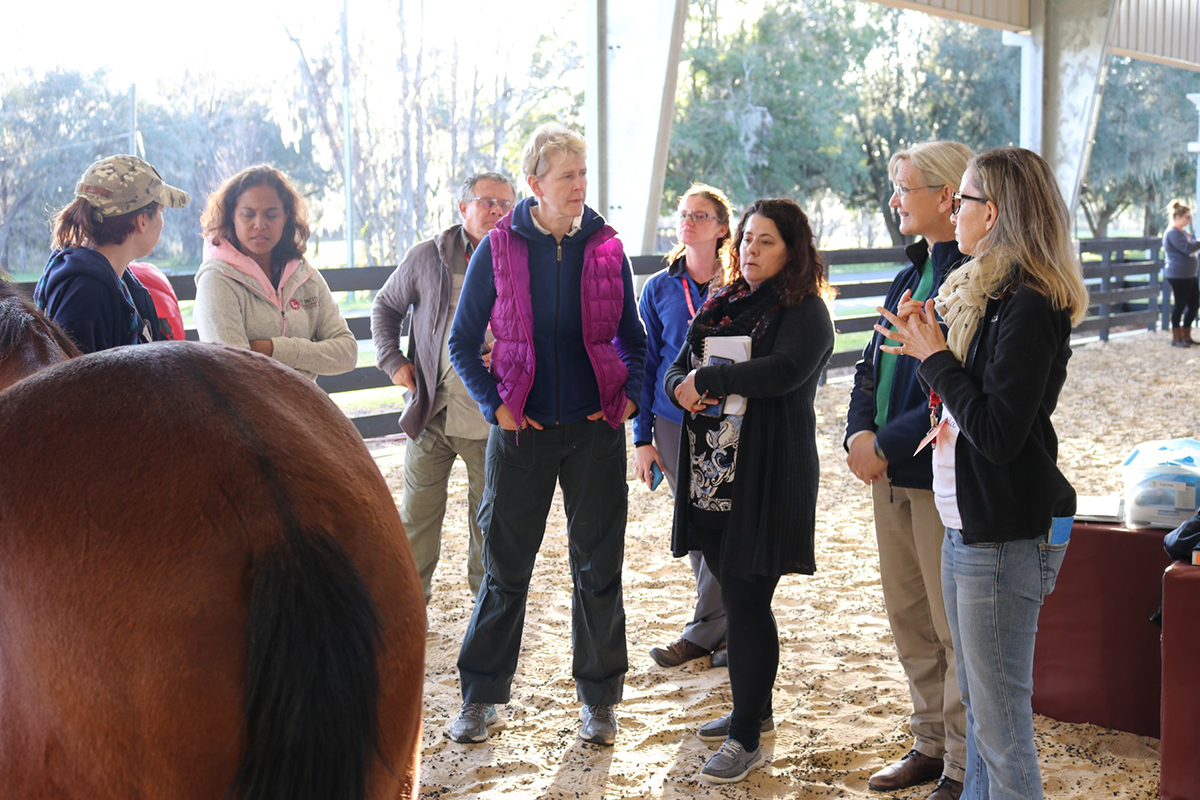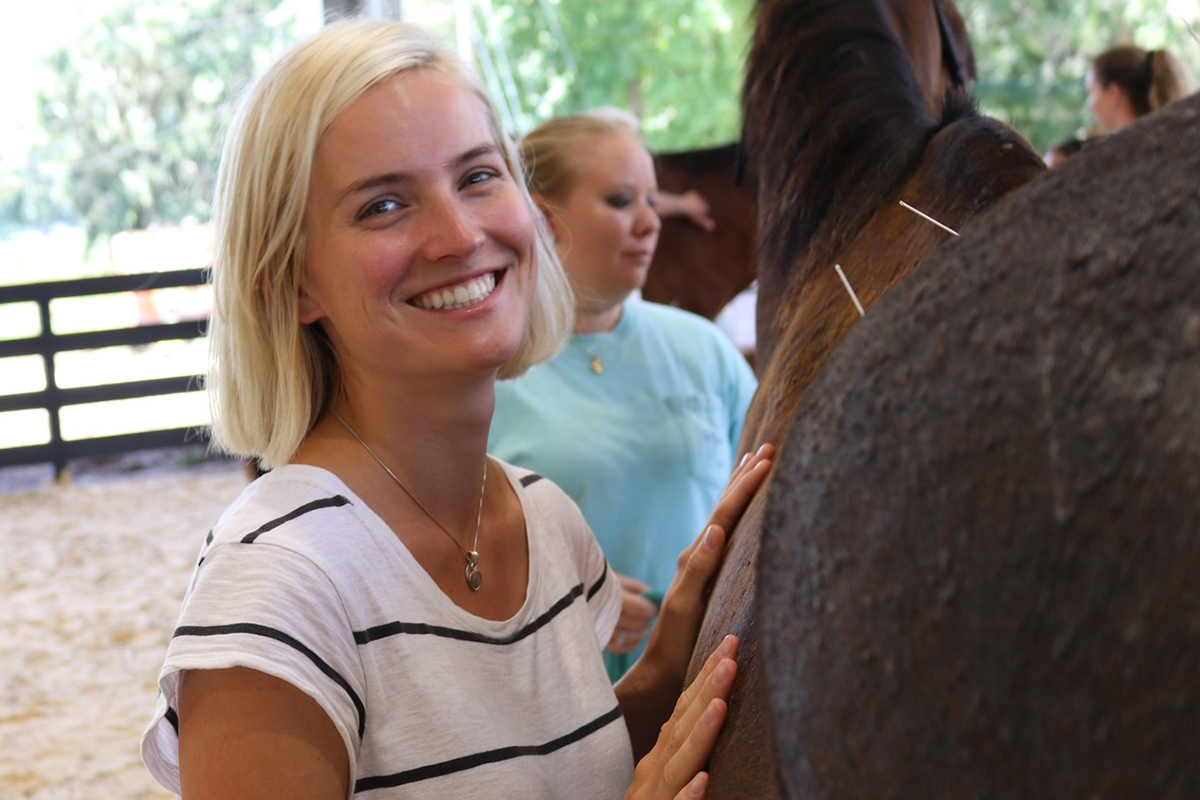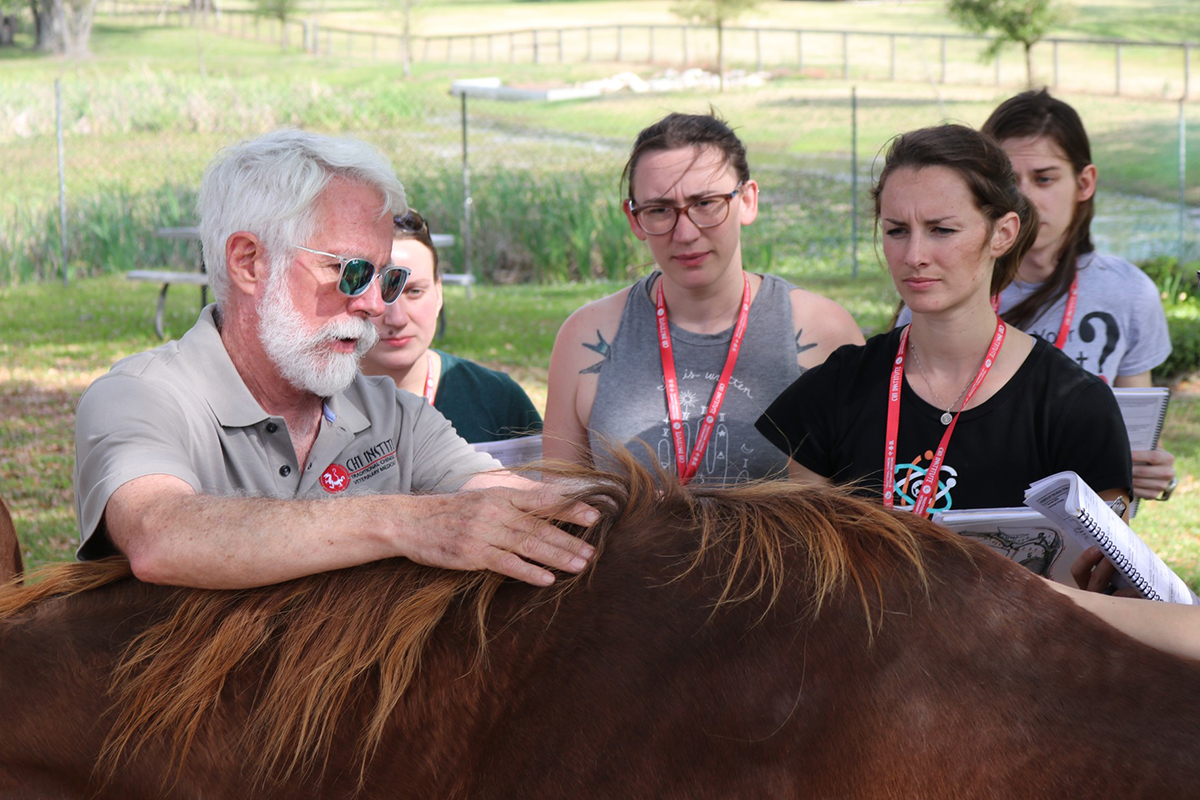
Program Overview
The course begins with an overview of fundamental aspects of Chinese Medicine, including Yin-yang and Five Element theory. These theories serve as a foundation for case diagnosis and treatment presented later in the class. A variety of acupuncture techniques are taught in addition to conventional "dry needling", including electro-acupuncture, aqua-acupuncture, and moxibustion. In acupoint labs, students learn acupuncture points on horses. Class is limited to 12 students for an intensive and intimate learning experience.
The course consists of an online session and an on-site session. The online session contains 5 modules with lectures and case demos that students can stream at their convenience. The on-site session contains 3 modules hosted at UC-Davis College of Veterinary Medicine. These in-person modules provide students with the opportunity to learn acupuncture points on live animals in small lab groups with a maximum of six students per instructor. Tutoring sessions totaling 12 hours thoroughly prepare students for exams.

Major Topics
With a curriculum designed for students new to acupuncture, the Equine Acupuncture Program provides a comprehensive mix of both theory and practice. You will learn:
- Frameworks used in acupuncture: Five Elements, Yin-Yang, Eight Principles, Zang-Fu Physiology and Pathology, Meridians and Channels
- The scientific basis of acupuncture
- Learn how to locate 256 acupuncture points (acupoints) in horses
- Acupuncture techniques: electro-acupuncture, aqua-acupuncture, moxibustion, and dry needling
- TCVM diagnostic systems: patient personality, tongue and pulse diagnosis, and client inquiry
- How to integrate acupuncture into your practice

Additional Benefits
Once enrolled for the Acupuncture Certification Track, you will receive:
- Complimentary equine acupont chart
- Complimentary 32-hour Evidence-Based Veterinary Acupuncture Course
- 1-year complimentary membership with the World Association of TCVM (WATCVM)
- Free lifetime case consultation by Chi faculty
Program Features
Enjoy the convenience of online learning
Learn from Dr. Xie, the master of veterinary acupuncture
32 hours of intensive hands on learning with live animals in small lab groups capped at 6 students for every instructor
Start practicing acupuncture on patients after the first on-site session
Earn up to 25% of future master's degree credit per experiential learning
Veterinary Acupuncture Certification Track
Taught in English
For veterinarians & veterinary students only
98 Race Approved CE hours
No semesters currently available
On-site Sessionsat UC Davis SVM
On-site Module 1
Veterinary Acupuncture Wet Lab
12h
Tutoring/Reviewing Lectures, Real Case Demo and Questions/Answers
4h
On-site Module 2
Veterinary Acupuncture Wet Lab
12h
Tutoring/Reviewing Lectures, Real Case Demo and Questions/Answers
4h
On-site Module 3
Review Points and Techniques
8h
Tutoring and Q&A
4h
Clinical Acupoint Exam
4h
Written Exam
4h
Certification
CVA Certification
Students of the Veterinary Acupuncture program are eligible for the Certified Veterinary Acupuncturist certification endorsed by Chi University and the World Association of Traditional Chinese Veterinary Medicine (WATCVM). The CVA certification requirements are as follows:
Complete all sessions of the program
Pass three online quizzes with scores above 75%
Pass the final written exam in the final on-site session with a score above 75%
Pass the clinical acupoint exam in the final on-site session with a score above 75%
Submit one veterinary acupuncture case report to be approved
Complete 30 hours of advanced TCVM program training or internship with a certified veterinary acupuncturist
Please note that Chi cannot issue any certification to veterinary students until their DVM or equivalent has been obtained.
Textbooks
Instructors
Huisheng Xie
DVM, PhD
Dr. Xie has 42 years of clinical, teaching, and research experience in veterinary acupuncture and TCVM. He has trained over 11,000 veterinarians to practice TCVM worldwide. Dr. Xie’s education includes advanced training in veterinary medicine, veterinary acupuncture, and human acupuncture. Dr. Xie has authored 20 books and over 100 peer-reviewed papers. His textbooks, including Xie’s Veterinary Herbology, Xie’s Veterinary Acupuncture, and Traditional Chinese Veterinary Medicine-Fundamental Principles, have been used for TCVM training programs around the world. Dr. Xie continues to teach and develop educational courses and programs at Chi University, serves as a full clinical professor at the University of Florida’s College of Veterinary Medicine, and is an honorary professor at China Agricultural University, South China Agricultural University, and China Southwest University.
Read moreRoger Clemmons
DVM, PhD, DACVIM (Neurology and Neurosurgery), CVA, CVFT
Dr. Clemmons graduated with his DVM from Washington State University. There, he also was granted a PhD in veterinary science (emphasis in neurophysiology and clinical neurology). Dr. Clemmons then took a faculty position at the University of Florida’s College of Veterinary Medicine where he practiced neurology and neurosurgery for 35 years before joining the private Veterinary Specialty Hospitals in Florida. Dr. Clemmons, a board-certified specialist in Neurology, has published over 100 peer-reviewed original studies, reviews, papers and abstracts and given numerous presentations, both in the US and abroad. At UF, he has had an active research program and is known for his work on platelet physiology and in the study of neurodegenerative diseases such as degenerative myelopathy. He has developed a number of innovative neurosurgical techniques including fixation of atlantoaxial subluxation and Wobbler’s syndrome. Dr. Clemmons taught veterinary and graduate students at the University of Florida for 35 years. Dr. Clemmons became a certified veterinary acupuncturist (CVA) at Chi in 2000. He was certified in TCVM Food therapy (CVFT) from Chi in 2009. He integrates Veterinary Acupuncture, Herbal Medicine, and nutrition into his practice. He is a national and international speaker in the field of neurology and the science of veterinary acupuncture.
Carla Pasteur
DVM, MSTCVM, CVA, CVTP, CVMMP, CVSMT, CERP
Dr. Pasteur grew up showing horses in many disciplines, including reining, saddleseat, dressage and pleasure. She graduated in 1991 from the University of Wisconsin and opened an equine exclusive clinic in Green Bay. The practice grew to cover five counties, with emphases on reproduction and lameness. She received her acupuncture training from IVAS in 1997, sold her conventional practice and began an equine alternative practice. She has been a Chi instructor since 2005 and has lectured internationally. Her current practice encompasses TCVM, veterinary medical manipulation and osteopathy, focusing on sport and performance horses.
Allison Faber Marshall
DVM, MS, CVA, CVSMT
Dr. Allison Faber Marshall graduated from University of Florida College of Veterinary Medicine in 1995 and moved to Virginia into general equine practice. She opened Full Circle Veterinary Services, PC in 2005 after becoming a Certified Veterinary Spinal Manipulation Therapy (CVSMT) through Healing Oasis Wellness Center and a Certified Veterinary Acupuncturist (CVA) through Chi University where she also trained in veterinary herbal medicine, food therapy, and tui-na, culminating in completion of a Master’s of Science in Traditional Chinese Veterinary Medicine. Dr. Marshall served on the AAEP ethics committee from 2010-2013. She has been an instructor at Chi since 2010. Her busy practice is limited to equine alternative therapies in Virginia and Maryland, and she enjoys a large variety of sport horses and beloved friend as patients. She has 3 grown children, and is an avid surfer, knitter, yarn spinner, gardener, and works to keep her many interests and profession in balance.
Frequently Asked Questions
Do I have to take acupuncture classes in a prescribed order or can I start at any time?
You must start at session one and continue along in order. If you have mitigating circumstances, you will have to defer all following sessions until the next semester.